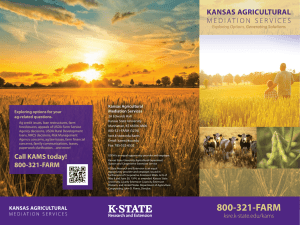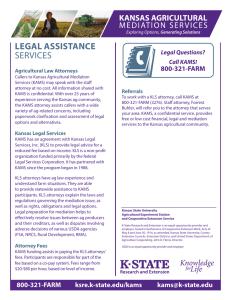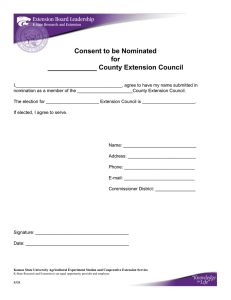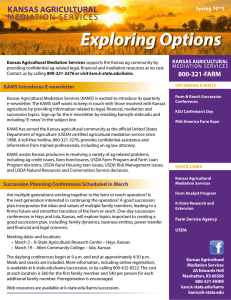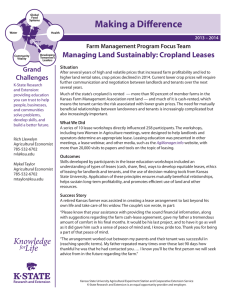Exploring Options 800-321-FARM Fall 2015
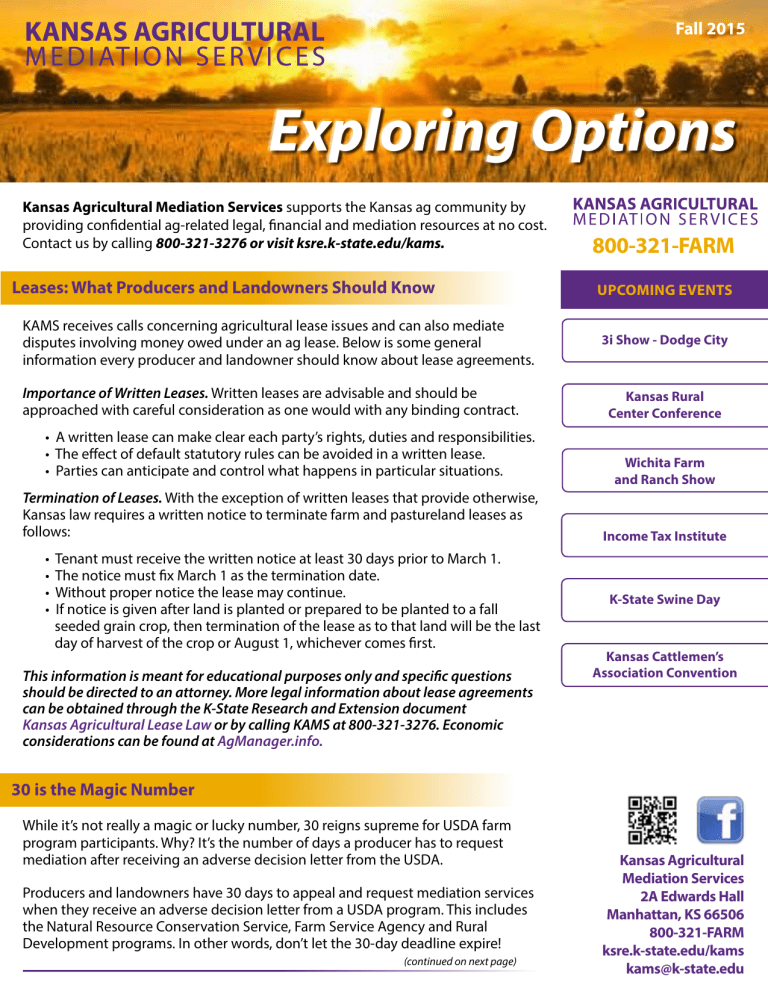
Fall 2015
Exploring Options
Kansas Agricultural Mediation Services supports the Kansas ag community by providing confidential ag-related legal, financial and mediation resources at no cost.
Contact us by calling 800-321-3276 or visit ksre.k-state.edu/kams.
Leases: What Producers and Landowners Should Know
KAMS receives calls concerning agricultural lease issues and can also mediate disputes involving money owed under an ag lease. Below is some general information every producer and landowner should know about lease agreements.
Importance of Written Leases.
Written leases are advisable and should be approached with careful consideration as one would with any binding contract.
• A written lease can make clear each party’s rights, duties and responsibilities.
• The effect of default statutory rules can be avoided in a written lease.
• Parties can anticipate and control what happens in particular situations.
Termination of Leases.
With the exception of written leases that provide otherwise,
Kansas law requires a written notice to terminate farm and pastureland leases as follows:
• Tenant must receive the written notice at least 30 days prior to March 1.
• The notice must fix March 1 as the termination date.
• Without proper notice the lease may continue.
• If notice is given after land is planted or prepared to be planted to a fall
seeded grain crop, then termination of the lease as to that land will be the last
day of harvest of the crop or August 1, whichever comes first.
This information is meant for educational purposes only and specific questions should be directed to an attorney. More legal information about lease agreements can be obtained through the K-State Research and Extension document
Kansas Agricultural Lease Law or by calling KAMS at 800-321-3276. Economic considerations can be found at AgManager.info.
30 is the Magic number
While it’s not really a magic or lucky number, 30 reigns supreme for USDA farm program participants. Why? It’s the number of days a producer has to request mediation after receiving an adverse decision letter from the USDA.
Producers and landowners have 30 days to appeal and request mediation services when they receive an adverse decision letter from a USDA program. This includes the Natural Resource Conservation Service, Farm Service Agency and Rural
Development programs. In other words, don’t let the 30-day deadline expire!
(continued on next page)
800-321-FARM
UPcoMing EvEntS
3i Show - Dodge city
Kansas Rural center conference
Wichita Farm and Ranch Show income tax institute
K-State Swine Day
Kansas cattlemen’s
Association convention
Kansas Agricultural
Mediation Services
2A Edwards Hall
Manhattan, KS 66506
800-321-FARM ksre.k-state.edu/kams kams@k-state.edu
When a producer receives a letter from a USDA program they should review it carefully and if they have questions they should contact their local USDA office or
KAMS. If they wish to use mediation as an appeal option, they should call the KAMS office immediately (800-321-3276). KAMS will ask the producer to mail or fax the letter in right away and also send a signed and dated request for mediation services.
When both items are received, it will stop the clock ticking on the appeal timeline and save the remaining days should mediation be unsuccessful in resolving the situation. Unresolved situations may be given options for further appeal.
KAMS staff will also set up a time for Forrest Buhler, the KAMS staff attorney, to return a call to the producer or landowner and review the situation and options available to prepare for mediation. All services over the phone are confidential and cost nothing.
So, remember, don’t let the 30-day deadline expire! If you receive an adverse decision letter, call the KAMS office and we will help you explore options. Our number is
800-321-3276 and information about KAMS support services to aid in mediation can be found at: k-state.edu/kams/resources/kams.
Who can Request Mediation?
Kansas agricultural producers and landowners are not the only ones who can request mediation. Ag creditors such as banks, suppliers, implement dealers, cooperatives, Farm Credit Services and the Farm Service Agency may call KAMS to discuss situations that may be resolved through mediation. Typically, mediation is requested after a creditor advises the producer of a delinquent loan or account.
In some cases, a producer may need to analyze their business model in order to operate more effectively, restructure existing loans or look into other credit options.
KAMS support services and mediation allows producers and creditors to keep the lines of communication open and preserve relationships as they explore options and generate solutions.
Kansas agriculturists can also request mediation as an alternative to a formal appeal if they receive an adverse decision letter from a USDA agency. This includes adverse decisions from the Natural Resource Conservation Service, Farm Service Agency and
Rural Development.
Remember, KAMS is available to help with any type of ag financial or legal question, even if it does not concern mediation. We take the time to listen to your inquiries with respect for your confidentiality. It costs nothing to visit with us by phone at
800-321-3276.
QUicK LinKS
SW KS Women in Agriculture
Kansas Agricultural
Mediation Services
2015 Ag Lenders
K-State Research and
Extension
Farm Service Agency
Kansas Agricultural
USDA
Farm Analyst Program
K-State Research and
Extension
Farm Service Agency
USDA
Kansas Agricultural
Mediation Services
2A Edwards Hall
Manhattan, KS 66506
800-321-FARM ksre.k-state.edu/kams kams@k-state.edu
